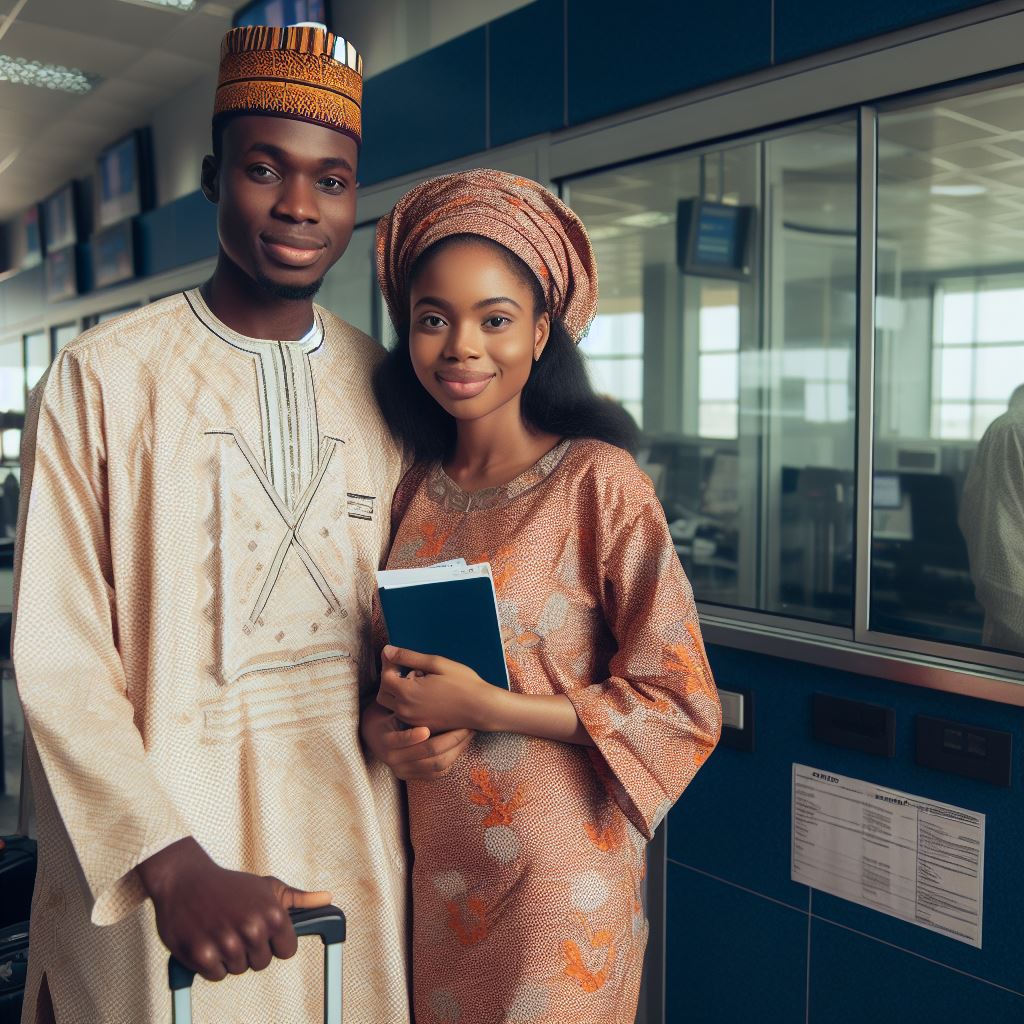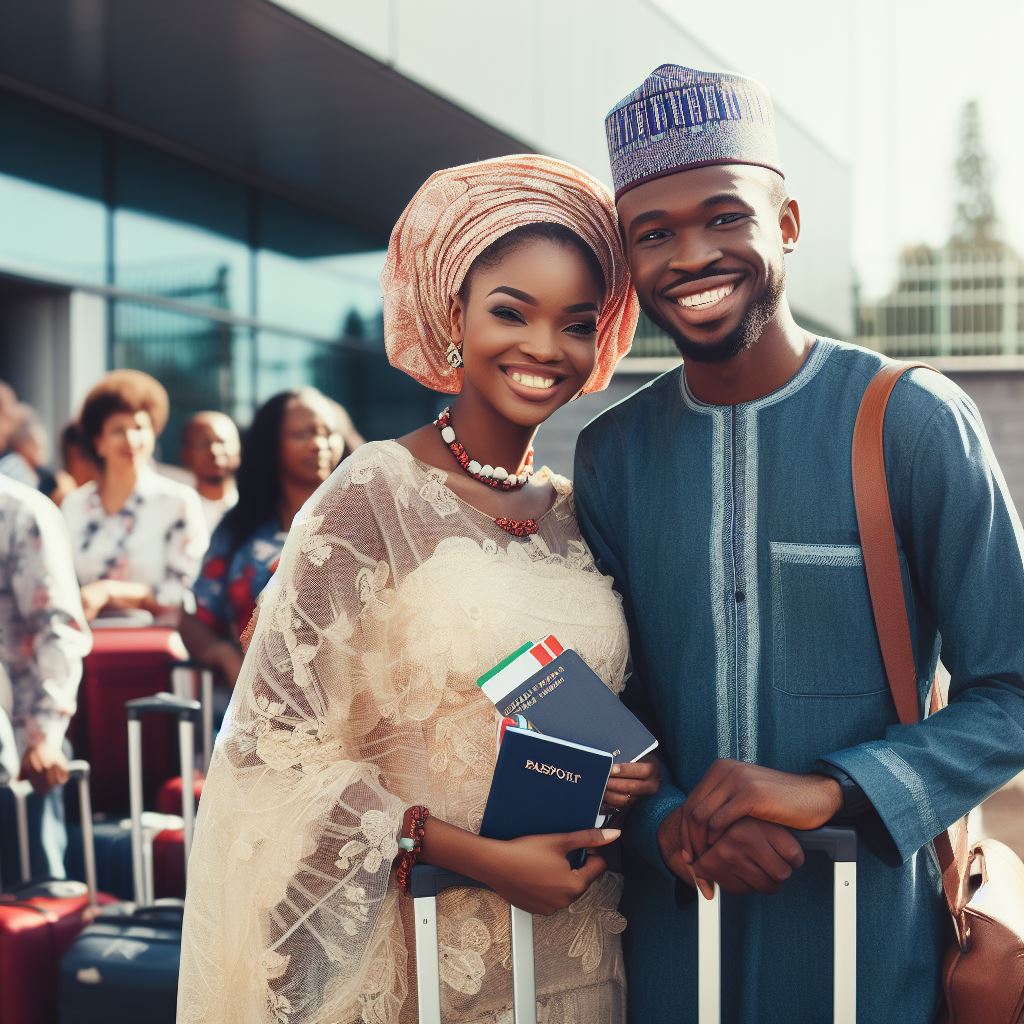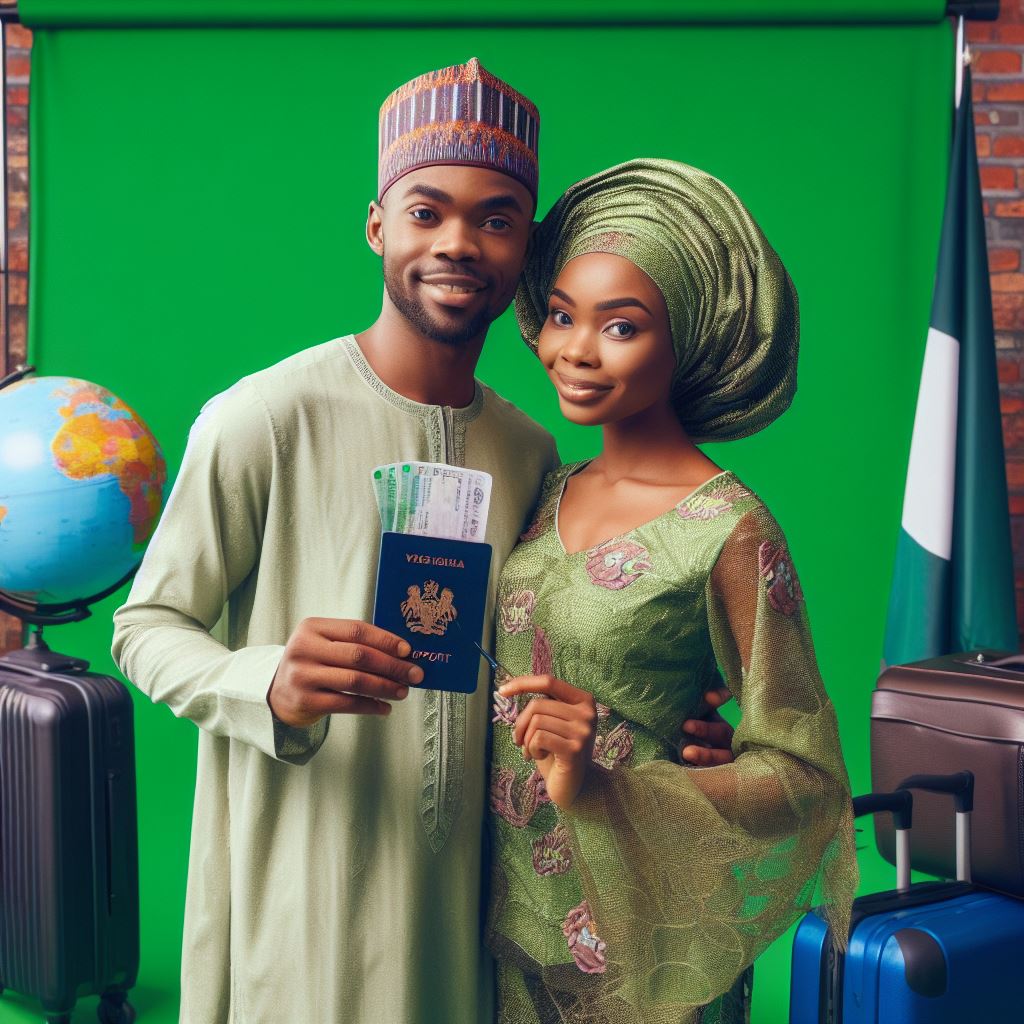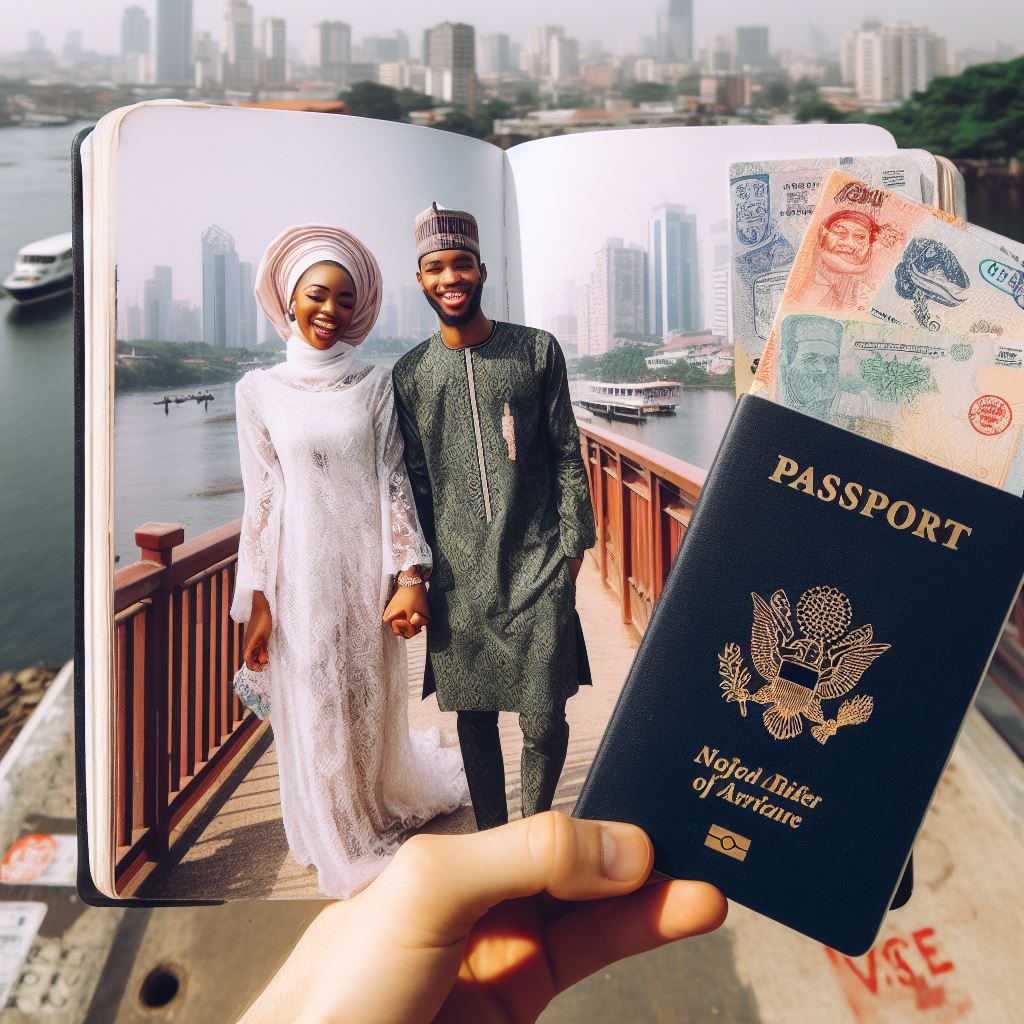Introduction
Marriage and citizenship in Nigeria play a vital role in the lives of its citizens.
It is crucial to understand the laws surrounding this area as they greatly impact individuals.
Nigeria, a vibrant tapestry of cultures, traditions, and landscapes, boasts a rich and diverse social fabric.
At the heart of this dynamism lies the institution of marriage, a cornerstone of Nigerian society.
However, beneath the surface of this time-honored union lies a complex interplay of legalities that govern not only the union itself but also the citizenship rights and responsibilities of those involved.
In this comprehensive guide, we embark on a journey through the intricate web of marriage and citizenship laws in Nigeria.
Without a comprehensive grasp, one may encounter various challenges.
We’ll unravel the legal nuances, shedding light on the rights, obligations, and potential challenges that couples, both local and international, might encounter.
From customary practices steeped in tradition to modern legal frameworks, we aim to provide clarity and insight into this fundamental aspect of Nigerian society.
Whether you’re a Nigerian national seeking to tie the knot, a foreigner contemplating marriage to a Nigerian partner, or simply a curious observer, this guide aims to be your compass.
By the end of this exploration, we hope you’ll not only understand the legal landscape but also gain a deeper appreciation for the significance of marriage within the Nigerian context.
Join us as we navigate through the intricacies of Nigeria’s marriage citizenship laws, illuminating a path towards informed decisions and a deeper cultural understanding.
Overview of Marriage Laws in Nigeria
Explanation of the Marriage Act and its provisions
Marriage is a legally binding union between two individuals, and in Nigeria, it is governed by the Marriage Act.
This act provides the legal framework for marriage in the country.
Types of marriages recognized in Nigeria: statutory marriages, customary marriages, Islamic marriages
The Marriage Act recognizes three main types of marriages: statutory marriages, customary marriages, and Islamic marriages.
Requirements and procedures for each type of marriage
Each type has its own requirements and procedures.
Statutory marriage
A statutory marriage is a civil marriage conducted in accordance with the provisions of the Marriage Act.
It is the most common form of marriage in Nigeria and is recognized both nationally and internationally.
To enter into a statutory marriage, the following requirements must be met:
- The individuals must be of marriageable age, which is 18 years old for both males and females.
- They must give notice of their intention to marry at the registry office in the district where at least one of them resides.
- There must be a waiting period of at least 21 days from the date of giving notice before the marriage can take place.
- They must obtain a marriage license from the registry office.
- The marriage ceremony must be conducted by a recognized marriage officer.
Customary marriages
On the other hand, customary marriages are conducted according to the customs and traditions of the ethnic group or community to which the individuals belong.
These marriages are only recognized in Nigeria and are not legally binding internationally.
For a customary marriage to be valid, the following requirements must be met:
- The individuals must comply with the customs and traditions of their ethnic group or community.
- The marriage must be celebrated in accordance with these customs and traditions.
- The marriage must be recognized by the community or ethnic group.
Islamic marriages
Unlike statutory and customary marriages, Islamic marriages are conducted according to Islamic law and are recognized both nationally and internationally.
These marriages are usually solemnized in accordance with the teachings and practices of Islam.
For an Islamic marriage to be valid, the following requirements must be met:
- The individuals must be of marriageable age and must consent to the marriage.
- The marriage must be witnessed by two competent Muslim witnesses.
- The marriage must be solemnized by an authorized Islamic scholar or cleric.
In short, Nigeria recognizes three main types of marriages: statutory marriages, customary marriages, and Islamic marriages.
Each type has its own requirements and procedures.
It is important to understand and comply with these laws to ensure the validity of your marriage and the legal rights and responsibilities that come with it.
Read: The Art of Compromise: Key for Successful Nigerian Marriages
Citizenship Laws in Nigeria
In Nigeria, citizenship is a significant aspect of one’s identity and legal status in the country.
Categories of Nigerian citizens
There are several categories of Nigerian citizens, namely: by birth, by descent, by registration, and by naturalization.
Nigerian Citizenship by Birth
Nigerian citizenship by birth is acquired if either of the parents is a Nigerian citizen or the individual is born within the territory of Nigeria.
Citizenship by Descent
Nigerian citizenship by descent is acquired if any of the individual’s grandparents or parents is a Nigerian citizen.
Nigerian Citizenship by Registration
An individual can attain Nigerian citizenship by registration if they meet specific requirements and complete the necessary processes.
These requirements usually include having resided in Nigeria for a certain period of time.
Citizenship by Naturalization
Nigerian citizenship by naturalization is obtained by foreigners who have lived in Nigeria for a significant number of years and fulfill certain conditions.
Requirements and Processes for Acquiring Nigerian Citizenship
To acquire Nigerian citizenship through registration or naturalization, the following requirements must be met:
- Applicant must be of full age and capacity.
- The applicant must have resided in Nigeria for a specified period of time.
- Applicant must be of good character and have a clean criminal record.
- Applicant must have a reasonable knowledge of the Nigerian language and customs.
- The applicant must renounce any other foreign citizenship they possess.
- Applicant must take an oath of allegiance to Nigeria.
Acquiring Nigerian citizenship through registration or naturalization
The processes for acquiring Nigerian citizenship through registration or naturalization involve:
- Submission of completed application forms, along with supporting documents, to the Nigerian Immigration Service (NIS).
- Payment of necessary fees and processing charges.
- Verification of documents and background checks by the NIS.
- Interview and assessment by the NIS.
- Approval by the Minister of Interior.
- Issuance of a certificate of Nigerian citizenship to successful applicants.
It is essential to note that the processes and requirements for acquiring Nigerian citizenship may be subject to change, and it is advisable to consult the appropriate authorities for the most up-to-date information.
In essence, Nigerian citizenship holds great significance and is available through various means such as birth, descent, registration, and naturalization.
Aspiring Nigerian citizens must fulfill specific requirements and undergo a series of processes to obtain citizenship in the country.
Read: How Parenting Shapes Marital Dynamics in Nigeria
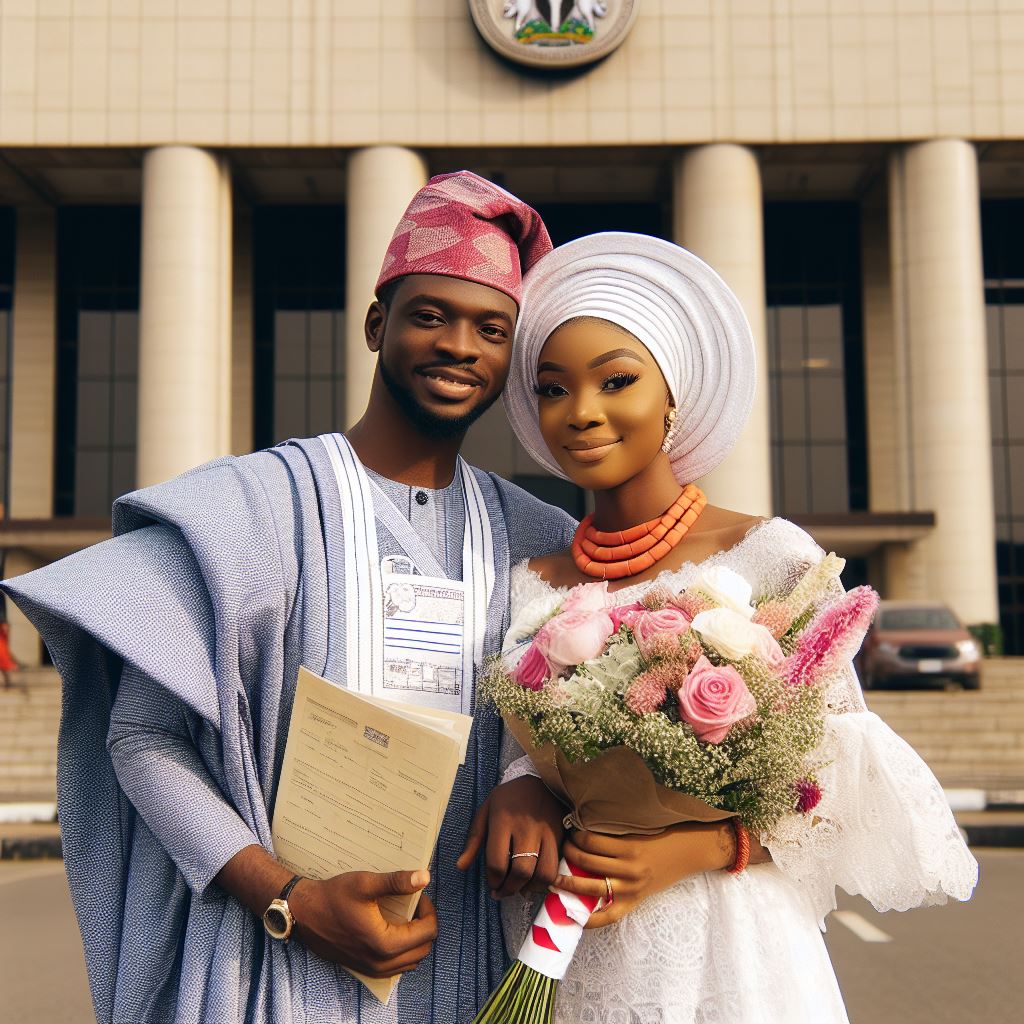
Marriage and Citizenship
Connection between marriage and citizenship in Nigeria
In Nigeria, marriage holds great significance, not only in cultural and social contexts but also in terms of citizenship.
The relationship between marriage and citizenship has both legal and practical implications for individuals involved.
How marriage affects citizenship status: acquiring or losing citizenship
Marriage can directly impact an individual’s citizenship status in Nigeria.
When a foreigner marries a Nigerian citizen, they may become eligible to acquire Nigerian citizenship.
This process involves fulfilling specific requirements, such as a residency period and evidence of a genuine marriage.
On the other hand, marriage can also lead to the loss of citizenship for a Nigerian citizen.
If a Nigerian citizen marries a foreigner and decides to acquire their spouse’s citizenship, they may be required to renounce their Nigerian citizenship.
This choice is crucial, as it affects their legal status and rights within Nigeria.
Consequences of marriage to a Nigerian citizen for foreigners
For foreigners who marry Nigerian citizens, there are various consequences to consider.
Firstly, marriage to a Nigerian citizen may provide foreigners with the opportunity to obtain legal residency and access to social benefits in Nigeria.
This can be particularly beneficial for those seeking to live and work in Nigeria.
However, it is important to note that marriage alone may not automatically grant citizenship rights to foreigners.
They must follow the appropriate legal procedures and complete the necessary documentation to acquire Nigerian citizenship.
It is advisable to seek legal advice to ensure compliance with Nigerian immigration laws during this process.
Additionally, the consequences of marriage to a Nigerian citizen may extend beyond legal rights.
Foreigners may experience cultural adjustments and challenges as they integrate into Nigerian society.
Language barriers, unfamiliar traditions, and adapting to a new way of life are aspects to consider when marrying a Nigerian citizen.
Marriage provides a pathway for individuals to potentially contribute to the economic growth of Nigeria.
By marrying Nigerian citizens, foreigners can form connections within the country and engage in business opportunities, fostering economic collaboration between Nigeria and their home country.
In review, marriage and citizenship are closely intertwined in Nigeria.
The legal and practical implications of marriage impact both foreigners and Nigerian citizens.
While marriage can facilitate the acquisition of citizenship or legal residency, it may also result in the loss of Nigerian citizenship for some individuals.
Understanding the consequences of marriage is essential for navigating Nigeria’s citizenship laws effectively.
Read: Modern Love: Changing Perspectives on Marriage in Nigeria
Navigating Marriage Citizenship Laws
Importance of understanding and complying with the laws
Understanding and complying with marriage citizenship laws is crucial for couples in Nigeria.
Failure to adhere to these laws can result in legal complications and potentially invalidate the marriage.
Compliance ensures the couple’s rights, privileges, and responsibilities as citizens are properly recognized.
Seeking legal advice before and during the marriage process
Before entering into marriage, seeking legal advice is essential in understanding the citizenship implications.
A legal professional can guide couples through the process, explaining the requirements and potential challenges
Consulting legal experts during the marriage process ensures compliance with all relevant legal procedures.
Potential challenges and complications faced by couples navigating marriage citizenship laws
Couples with different nationalities face challenges related to citizenship and immigration requirements.
Challenges may arise in proving the validity of their marriage in relation to citizenship rights.
Issues with documentation, such as obtaining marriage certificates, can also complicate the citizenship process.
Depending on the couple’s situation, they may need to navigate additional procedures and paperwork.
It is important for couples to be prepared for possible delays and complications in the citizenship application process.
Navigating Nigeria’s marriage citizenship laws requires a thorough understanding of the legal requirements.
Seeking legal advice before and during the marriage process can help couples navigate potential challenges and ensure compliance with all relevant procedures.
Couples should be prepared for possible complications and delays, especially if they have different nationalities.
Compliance is crucial to safeguarding their rights and privileges as citizens.
Read: Understanding Marriage Laws and Rights in Nigeria
Important Considerations
Impact of Nigerian marriage citizenship laws on couples with international backgrounds
Nigerian marriage citizenship laws can have significant implications on couples with international backgrounds.
These laws may affect the rights and privileges of foreign spouses in terms of residency and employment.
Understanding these laws is crucial to navigate the challenges that may arise due to differences in citizenship.
Dual citizenship and its implications for married couples
Nigeria recognizes dual citizenship, allowing Nigerians to hold citizenship in another country while retaining their Nigerian citizenship.
For married couples where one spouse is a Nigerian citizen and the other holds citizenship in another country, dual citizenship can bring various benefits.
Dual citizenship permits spouses to enjoy the rights and privileges associated with both countries, enhancing their international mobility and opportunities.
Role of marriage certificates and other documents in proving citizenship and marital status
Marriage certificates play a vital role in proving the marital status of couples in Nigeria.
These certificates act as legal documents that validate the union between two individuals.
Additionally, marriage certificates can be used as evidence of a spouse’s citizenship and eligibility for various benefits.
Other documents such as passports, identification cards, and residence permits may also be required to establish citizenship and marital status.
Marriage certificates and other documents serve as essential proof of citizenship and marital status for couples navigating Nigerian laws.
Conclusion
Navigating marriage citizenship laws in Nigeria is crucial for both citizens and expatriates.
It is important to understand the legal requirements and implications to ensure a smooth and legal process.
Seeking professional assistance is highly encouraged to avoid any complications or misunderstandings.
In a nutshell, understanding the impact of Nigerian marriage citizenship laws on couples with international backgrounds is crucial.
Dual citizenship can offer significant advantages to married couples, allowing them to enjoy the benefits of both countries.
By following the key points discussed in this blog, individuals can navigate these laws successfully and protect their rights and interests.
Remember, knowledge is power, and staying informed is essential when it comes to marriage and citizenship in Nigeria.

